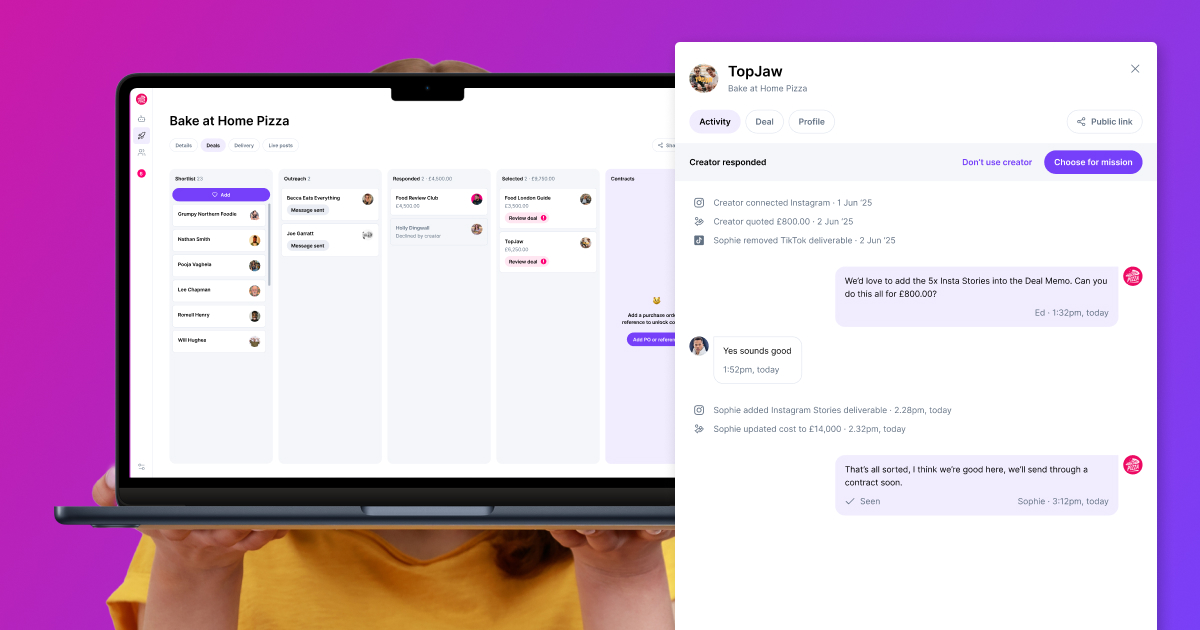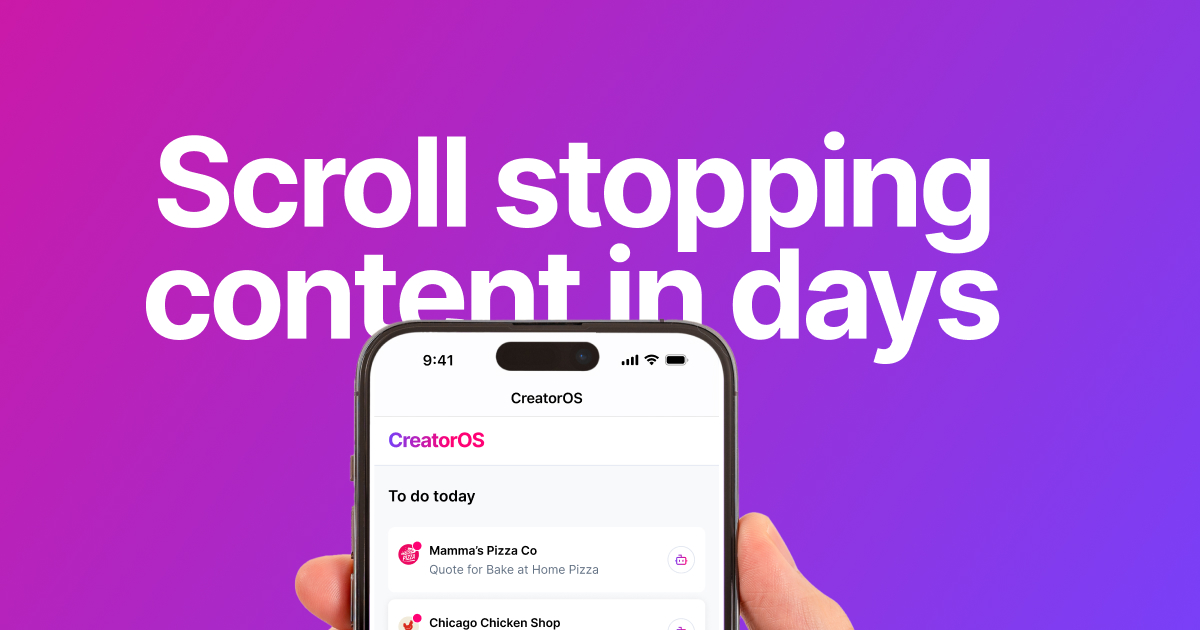
Our digital world is buzzing with endless possibilities, and influencer marketing stands out like a beacon for brands looking to make a splash. Navigating this space can feel overwhelming, and getting started on your own can be tough without expertise, a specialist agency or a big team to help. This is where influencer marketing tools and platforms come in, helping you navigate and sometimes automate parts of the process to make it easier and quicker. With that in mind, choosing the right tools can make all the difference.
Could the right influencer marketing platform be your key to unleashing unparalleled brand success in the UK?
As brands do more influencer campaigns, and do increasing amounts of collaborations, the need for influencer marketing tools and platforms has become almost indispensable. They offer a streamlined path for brands, aiming to make processes quicker and less painful. They also mean brands can track and manage multiple campaigns without the need for lengthy emails, spreadsheets and slow, manual processes.
The role these platforms play goes beyond mere convenience; they’re the engine that shifts campaigns into high gear.
Utilising influencer marketing tools allows you to scale your campaigns by automating time-consuming tasks, freeing up resources, and boosting productivity. Good influencer marketing software will speed up the search for the right creators, automate outreach with briefs and even handle responses and quotes instantly too. As a result, brands require platforms that help them run multiple influencer marketing campaigns at once, and handle a large volume of influencer content that needs feedback, approvals and measuring.
Imagine managing multiple influencer programs across different social media channels with ease! The best influencer platforms act as centralised hubs where you can monitor and manage campaigns, saving your precious hours while enhancing productivity and accuracy.
Another significant benefit is accessing insights in real time. With advanced analytics and tracking features, these platforms provide real-time data on influencer performance and campaign success. Such insights are invaluable for making informed decisions during any marketing endeavour. You can track engagement rates, conversions, and ROI directly through the platform, offering you a microscope to scrutinise every facet of your campaign.
In a nutshell, influencer marketing platforms offer a multitude of advantages to brands and agencies. They not only simplify campaign management but also strengthen influencer relationships by fostering seamless collaborations. Whether you’re a brand looking to boost visibility or an agency managing diverse clients, these tools provide the solution for efficient and effective marketing engagements.

Choosing the right features in an influencer marketing platform can save you hours in time spent running campaigns, and therefore thousands in budget too. The best platforms will provide significant net value, and shouldn't feel like a cost at all. If you're using a platform that "feels" expensive, it might be time to try a new one! Below is a set of questions you can ask of any platform, choose the best for you and get reaching out to creators straight away.
Typically platforms fall into two types; tools and marketplaces. The general difference is that tools are purely built for brands, and will focus on helping brands manage and plan campaigns, and find content creators. Marketplaces approach things slightly differently - the focus is more on connecting brands with creators, and doing this at scale. They focus on bringing creators closer to the brand, and may have their own set process for collaborating (not always, though). We'll get into some of the other differences in the sections below, too.
Writing good briefs is absolutely key to the success of any campaigns. It's how you start everything off; a good brief could set you on your way to a great campaign, and a poor brief can instantly set you up for failure. Some platforms are designed for more experienced social media experts, and let them get on with uploading and creating briefs. Other platforms will use clever designs to walk you through the briefing process, and some now use AI to help you form creative ideas and write clear, effective and accurate briefs.
Every platform has it's specialist area. If you want to engage Instagram influencers with product gifts to drive reviews, you want a platform that specialise in this. Some platforms will have integrated tracking for things like TikTok shop and other affiliate marketing services, which might make one of those a good fit for you (especially if they integrate with a platform you already use). Other platforms, like CreatorOS, mainly support paid collaborations and paid content creation.
Always find out how many creators a platform gives you access to. Some will list millions of creators globally, or specialise in particular countries and markets. Other platforms will only list tens of thousands of creators in a particular market, but might have more stringent rules on who they list, using brand safety metrics or deeper vetting before they list a creator on their platform. The advantage of being more selective in who is listed on a platform, is that they are doing the work for you - while millions of creators sounds great, many may not be professional creators at all, and ultimately not responsive, or inexperienced in working with brands.
Some platforms will offer you open access to anyone you wish to approach and work with. To do this, the creator, if they haven't already, will need to connect to that platform. This gives you flexibility to reach out to anyone, with the requirement on the creator side to connect before a deal is agreed. On the flip side, some platforms have a closed network of (typically smaller or UGC) creators and you are limited to working with those creators. Although you lose open market access, the theory is that they are more engaged and responsive on average (it should be noted that many closed networks only really give brands access to a much smaller, engaged number of their total network).
This is where tools vs. marketplaces come in again. Most tools build primarily for brands, and solving their problems. As a two sided relationship, there's a growing feeling that in order to really solve brand pain (e.g. slow-moving deals), you need to build a nice experience for creators too. At CreatorOS we take this a step further, and actively build products that support social media influencers in being more professional, knowing their price, and even proactively pitching ideas to brands like you.
This is actually another thing that sets platforms apart. The more traditional way to do influencer marketing is to go out and find creators you like, reach out and negotiate deals. Over the years there's always been other processes, like the idea of a brand just putting out a brief, and letting creators come back and 'apply' to be part of it. Taking that a step further, some platforms even ask creators to make the content, submit it, and get paid if the brand likes it. YouTube and TikTok have both made products around this process. The upside for brands can seem attractive - write a brief and skip the search, just let creators come to you. The reality that we hear is that what you can end up with is fed up and disillusioned creators feeling exploited, and brands overwhelmed by more content than they can watch. What may seem like a great idea sometimes ends up creating more friction in the long run.
Always worth a question on this one. Analytics can be a tricky one to figure out. Some platforms crunch lots of data and create "creator trust scores" and their own variations along a similar theme. At CreatorOS we stick to a more simple method, using a few key metrics like views and engagement to give a sense of performance (we vet creators so don't 'score' in the same way). You will also find some platforms use AI-powered data to show you their likely demographics, although it's worth noting that unless that data comes from the platform themselves, it's probably not overly accurate.
As well as analytics before you choose creators, do they track posts and content once they're live. The best platforms will have proper API access across Meta, TikTok etc and return all the deeper analytics that usually only creators can see. This includes Reach, Watch Time, Completion rate % and even full demographics of who watched the video. You should always insist on a platform that can see beyond simple views and engagement.
Communication is another critical factor. Some platforms integrate direct messaging for quick communication with influencers, meaning quicker and clearer conversations before, during and after agreements are made and content goes live. Other platforms rely on email to converse with creators - this keeps costs down for them (and maybe you), but it's much less effective.
Often the biggest consideration for a brand is cost and pricing structure (although given how many other elements there are to consider, that's a shame!). Many platforms will charge a subscription, which might be a simple monthly or annual fee, restricted to so many logins for the team. One person logs in, and they're the only person who can use the tool. Other platforms will mix it up, charging lower subscriptions but will include minimum campaign spend limits, campaign set up fees and other extras too - a bit more flexibility but also a bit confusing. CreatorOS purely charges a fixed % on top of what brands spend, making the fees fully flexible. We don't charge for access or even platform use before contracts are signed (you can shortlist and even reach out / chat live to creators).
In conclusion, the secret to winning at influencer marketing lies not just in choosing a stellar platform but in matching it with your brand's needs and vision. There's so many things to consider, at the end of the process you just have to pick the platform that suits your needs the best.
So, tell us, what key features do you value most when selecting an influencer marketing platform in the UK? Your thoughts might just inspire others in this dynamic industry!







Influencer marketing involves partnering with popular social media personalities who can promote a brand's products or services. It leverages the influencer's reach and credibility to attract their audience's attention, raising brand awareness and driving sales.
A dedicated platform streamlines the process of finding suitable influencers, managing campaigns, and tracking performance. It saves time, provides valuable data analytics, and often offers tools to ensure campaigns are effective and influencers align with your brand identity.
Look for features like a robust influencer database, in-depth analytics, easy communication tools, and campaign management capabilities. An ideal platform should also offer local market insights, comply with UK advertising regulations, and ensure influencer-audience engagement authenticity.
Check metrics like engagement rates, audience demographics, and follower growth over time. Platforms often provide this data. Additionally, ensure their content aligns with your brand values, and watch for any sudden spikes in followers, which could indicate fake accounts.
Like any marketing strategy, there are risks such as partnering with influencers whose audience may not align with your brand or influencers with fake followers. A reputable platform minimises these risks by offering thorough vetting processes and performance analytics.
It depends a little on your campaign goals, as you should measure content based on what you are trying to achieve. But there's one particular overlooked metric - known as watch time. Watch time is not a publicly available metric, but you can see this data when you either use an influencer marketing platform, or request it manually from the influencer themselves. Watch time tells you how long, on average, people watched a video for. With most social media networks, a view means the video appeared on a phone for any amount of time, even 0.001 seconds. Watch time tells you the quality of the views you received, rather than just the number. Using watch time analysis, you can learn where viewers stayed engaged, and when they swiped away - which gives valuable insights for improving future content and collaborations.
In influencer marketing, brand safety refers to how safe an influencer is when they collaborate with a brand. Typically, this is judged by measures such as swear words in content, the topics covered by the influencer in their content, and how controversial they potentially are. Some measures include the toxicity of comments on the content, and the nature of the audience who the influencer reaches. Other measures may include things like follower fraud, with bots and fake followers being tracked. Ultimately, brand safety analyses the risk the brand is taking on through doing a collaboration.
CreatorOS is an AI-powered influencer marketplace, that connects brands and creators together in a quick and efficient way. CreatorOS builds tools for both brands and influencers to make collaborations and connections quicker and deeper, allowing creators to work more professionally with brands and make more successful content. Brands can access AI that helps them ideate and write clear briefs, manage multiple deals simultaneously, pay the right price for creators and deliver campaigns efficiently. CreatorOS handles contract and payment admin for brands, and doesn't charge subscription fees or limit access and seats.
CreatorOS was started in 2020 by Tim Mitchell and Will Cookson, originally setting out to create a product that helped social media creators monetise in different ways. After experimenting with products on platforms like Discord, Twitch and Instagram, they saw a big trend in the success for authentic video content, and wanted to make access to technology for both brands and creators more accessible and efficient for both sides. In 2024, Rishi Sharma joined the founding team to lead technology and add AI and machine learning into the platform, and create a more two-sided marketplace which thousands of UK creators now use to power their brand deals.

After years in agencies and brands, we saw how clunky and one-sided creator marketing had become - so we built something better.
CreatorOS focuses on what really matters: creative ideas, great relationships, and tools that make life easier for everyone involved. Simple pricing, connected creators, and a platform that helps both sides move quickly and work brilliantly together.